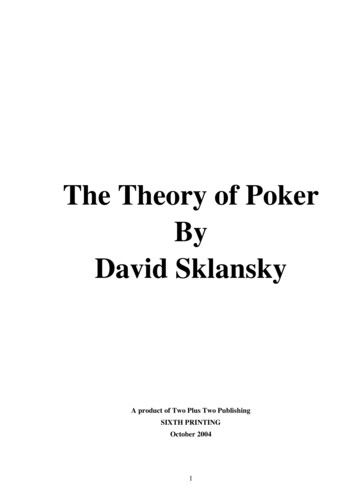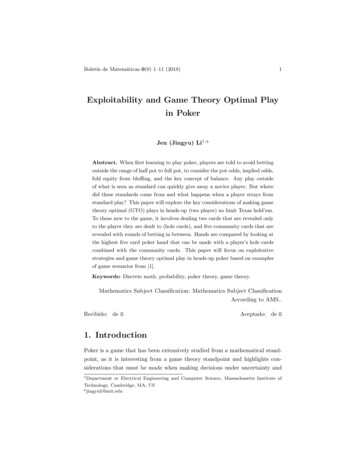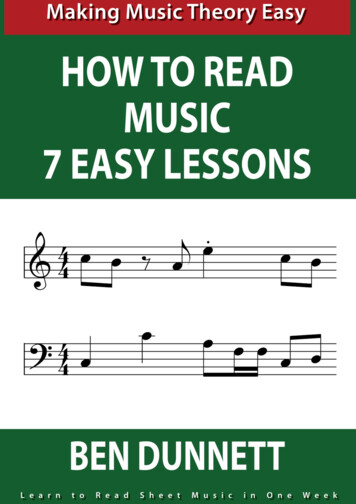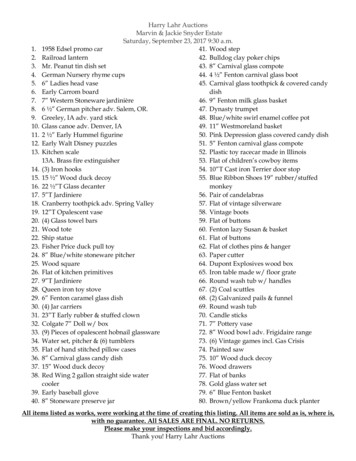
Transcription
The Theory of PokerByDavid SklanskyA product of Two Plus Two PublishingSIXTH PRINTINGOctober 20041
About David SklanskyDavid Sklansky is generally considered the number one authority on gambling in the worldtoday. Besides his nine books on the subject, David also has produced two videos and numerouswritings for various gaming publications. His occasional poker seminars always receive anenthusiastic reception including those given at the Taj Mahal in Atlantic City and the WorldSeries of Poker in Las Vegas.More recently David has been doing consulting work for casinos, Internet gaming sites, andgaming device companies. He has recently invented a new game called Poker Challenge, soon toappear in casinos.David attributes his standing in the gambling community to three things:1. The fact that he presents his ideas as simply as possible (sometimes with Mason Malmuth)even though these ideas frequently involve concepts that are deep, subtle, and not to be foundelsewhere.2. The fact that what he says and writes can be counted on to be accurate.3. The fact that to this day a large portion of his income is still derived from gambling (usuallypoker but occasionally blackjack, sports betting, horses, video games, casino promotions, orcasino tournaments).Thus, those who depend on David's advice know that he still depends on it himself.Other Books by David SklanskyHold 'em PokerGetting The Best of ItSklansky on PokerPoker, Gaming, and Life Sklansky Talks BlackjackGambling for a Living by David Sklansky and Mason MalmuthHold 'em Poker For Advanced Players by David Sklansky and Mason MalmuthSeven-Card Stud for Advanced Players by David Sklansky, Mason Malmuth, and Ray ZeePrefaceThis book is about the general theories and concepts of poker play, which are operative in nearlyevery variation of poker from five-card draw to Texas hold 'em. It is not a how-to book in thesense of providing the basic rules and a step-by-step procedure for playing the various games.Beginning poker players sometimes ask, "What do you do in this particular situation?" There isreally no correct answer to that question because it's the wrong question. Rules of thumb that sayto fold one hand, call with another, and raise with yet another simply won't get a poker playerbeyond the beginning stages.The right question is: "What do you consider in this particular situation before determining whatto do?" The Theory of Poker addresses itself to such considerations. It analyzes every aspect of apoker hand from the ante structure to play after the last card has been dealt. By explaining thelogic of poker, the book will, I hope, show the reader what kinds of things to think about in orderto become a better player.To illustrate the concepts presented, I use primarily five games - five-card draw, seven-card stud,hold 'em, draw lowball, and razz or seven-card lowball. For readers who may not be familiar2
with one or another of these games, I give brief summaries of their rules in the Appendix. I alsouse standard poker terms like flop, on board, sixth street, back-door flush, and the like. As muchas possible, I explain these terms in the text, but readers can avail themselves of the Glossary ofPoker Terms at the back of the book to check the definitions of any terms about which they areuncertain.The Theory of Poker is an expansion and total revision of the book Sklansky on Poker Theory,written by David Sklansky and originally published by Gambler's Book Club of Las Vegas in1978. That book was directed primarily to professional poker players. This book is directed topoker players in general, who know the basics, who may even be good players, but who want todelve deeper into the inner workings of the game. It is not an easy book, but a careful reading ofit should reap rich rewards. Note: This book was formerly titled Winning Poker.3
Chapter OneBeyond Beginning PokerThe beauty of poker is that on the surface it is a game of utter simplicity, yet beneath the surfaceit is profound, rich, and full of subtlety. Because its basic rules are so simple, anyone can learnpoker in a few minutes, and novice players may even think they're pretty good after a few hours.From the expert's point of view, the veneer of simplicity that deludes so many players intothinking they're good is the profitable side of the game's beauty. It doesn't take long for poolplayers or golfers to realize they're outclassed and to demand that a match be handicapped, butlosers in poker return to the table over and over again, donating their money and blaming theirlosses on bad luck, not bad play.It's true that in any given session the best of players can get unlucky. Going into the final day ofthe 1981 world championship of poker, Bobby Baldwin of Tulsa, Oklahoma, had a substantiallead over the eight other surviving players, Within a couple of hours he had two hands beat whenhis opponents outdrew him on the final card on 21 -to-1 shots. Suddenly he was out of thetournament, Coincidentally, in both hands Baldwin's opponent needed one of the two remainingqueens among the 44 unseen cards, and he got it.However, it is more likely for a good player like Baldwin to suffer these bad beats, as they arecalled, than for an average player or a weak player to suffer them. "I've heard good playerscomplain to me about how they get drawn out on ail the time," Baldwin said after the 1981tournament. "But if they want to better their game and better their emotional state while playing,they should realize it's a mirage. If you are an excellent player, people are going to draw out onyou a lot more than you're going to draw out on them because they're simply going to have theworst hand against you a lot more times than you have the worst hand against them. There's noway you're going to draw out on anybody if you don't get all your money in there on the worsthand."As Baldwin implies, expert players do not rely on luck. They are at war with luck. They use theirskills to minimize luck as much as possible. They figure they're getting the best of it, and theyleave lucky draws to their weaker opponents. To the extent that they are getting the best of it,they will win more often than they lose. Over the long run everybody gets the same proportion ofgood and bad cards, of winning and losing hands. Beginning poker players rely on big hands andlucky draws. Expert poker players use their skills to minimize their losses on their bad hands andmaximize their profits on their big hands. They also are able to judge better than others when abig hand is not the best hand and when a small hand is the best hand.Whatever your level of play, the succeeding chapters will introduce you to theories and conceptsof poker that will eliminate your reliance on luck and lead you to become an expert who relies onhis skills. For above all, you must remember that poker is not primarily a game of luck. It is agame of skill.The Forms of PokerPoker is a generic name for literally hundreds of games, but they all fall within a few interrelatedtypes. There are high games like seven-card stud and Texas hold 'em, in which the highest handin the showdown wins, and low games like draw lowball and razz, in which the lowest handwins. There are also high-low split games, in which the best high hand and the best low handsplit the pot. Among high, low, and high-low split games there are those like five-card draw, inwhich the hands are closed, and those like seven-card stud, in which some of the players' cardsare exposed for all to see4
Jokers, wild cards, and special rules may be introduced into any of these games to create suchaberrations as Baseball, Follow the Queen, Anaconda, and scores of other variations that havespiced up home poker for decades. Paradoxically, the two types of players who favor theseexotic poker variations are generally amateurs who want a lot of action and hustlers who prey onthese amateurs because their long experience allows them to adjust more easily to unusual gamesthan their amateur opponents tan. However, before a player can become an expert at exoticgames, he must understand the basic concepts of standard games.Another significant distinction among poker games is their betting structure. Most home gamesand most games in Las Vegas, Gardens, California, and elsewhere are limit games - that is,games in which limits are set on the minimum and maximum bets. Normally, in the smaller-limitgames of Las Vegas, such as l- 3 seven-card stud, there is no ante, and the low card starts theaction for 50 cents. In subsequent rounds, the high hand on board may check or bet 1, 2, or 3.In the higher-limit Las Vegas games and in the limit draw games of the card rooms of Gardena,the betting is rigidly structured. In Gardena the bets double after the draw. In Las Vegas theydouble in the later rounds of betting. In 5- 10 seven-card stud, for example, there is a 50-centante, low card starts the action, or brings it in, for 1, and on the next round the bets and raisesmust be 5, no more and no less. With an open pair after four cards, a player generally has theoption of betting 5 or 10, but anyone who raises must raise 10. After the fifth, sixth, andseventh cards, the bets and raises must be 10 whether or not anyone has a pair showing.In other poker games the betting structure might be pot-limit or no-limit. In a pot-limit game,bets and raises may be for any amount up to the size of the pot. Thus, with a 10 pot, someonemight bet 10 and be called by three players. The last player to call can raise 50, the currentsize of the pot. If one player calls the raise, the size of the pot would then be 150 so that in thenext round the first bet could be anything up to that amount.In no-limit poker, a player may bet or raise any amount up to what he has in front of him/her atany time. If he has 500 in front of him, he can bet that. If he has 50,000 in front of him, he canbet that. He cannot, however, raise a player with less money out of a pot. That player may simplycall with the money in front of him and a side pot is created for any remaining players. If hishand prevails, the player who is "all-in" can win only the money he called in the main pot, andthe best hand among those remaining wins the side pot. (The same mechanics apply to limitgames when a player is all-in.)Notwithstanding the great variety of poker games - high games and low games, stud games anddraw games, limit games and no-limit games - there is an inner logic that runs through all ofthem, and there are general precepts, concepts, and theories that apply to all of them. Howeverexperienced a player may be with the rules and methods of a specific game, like, say, five-carddraw, only by understanding and applying the underlying concepts of poker can he moveconfidently to the expert level. The principles of such stratagems as the semi-bluff (ChapterEleven) and slowplaying (Chapter Fifteen) are essentially the same in limit five-card draw pokeras in no-limit hold 'em poker, and they are equally important.Poker LogicPoker logic is not tricks and ploys. In weaker games tricks and ploys may sometimes work - forexample, gesturing as though to fold your hand and then raising after the third man in the pot hascalled. However, a super hustler with an arsenal of tricks and ploys who is not also a good playerwill not get the money against tough competition. Some poker writers make tricks and ploys theessence of poker; the best that can be said of them is they are misguided. Some players substitutetricks and ploys for sound precepts and sound play. They act surly, try to anger other players inthe game - in a word, use almost any gimmick other than good play to win the money on thetable. In the world of professional Las Vegas poker, such players never rise to the bigger games,5
and eventually, their tricks and ploys played out, they fade into the Las Vegas night like so manyfailed gamblers, earning a living driving a cab.Nor is poker logic purely mathematical. Knowing the mathematics of poker can certainly helpyou play a better game. However, mathematics is only a small part of poker logic, and while it isimportant, it is far less important than understanding and using the underlying concepts of poker.It is important to understand that poker is a much more difficult game than most people realize,that it can be more complex than bridge or backgammon. The concepts in this book are intendedto make you understand the depth of the game and to make you a good player against toughcompetition. (Obviously if you can beat tough games, you will have little trouble destroyingeasier games.) While the concepts discussed often apply to all poker games, they relateparticularly to limit games. Properly adjusted, they also relate to pot-limit and no-limit games.However, they do not always relate to games like high-low split, in which there are two winnersin a pot.The Object of PokerWhether you are playing 1 - limit poker at the kitchen table or pot-limit poker at the Stardust inLas Vegas, whether you are playing poker for fun or for a living, once a week or every day, youhave to understand that the object of the game is to make money. That's where the profits are.That's where the fun is. That's the way the game is scored. Jack Straus, 1982 poker champion,has said he'd bust his own grandmother if she was in a pot with him, which is pretty much theonly attitude a serious poker player can have when he or she sits down behind a stack of chips.Whatever the environment and whoever your opponents happen to be, you must play the gametough; you must play the game to win money. That does not mean you cannot joke or socialize,whether at the kitchen table or in a Las Vegas card room. Quite to the contrary. In a public cardroom people seem to mind losing their money to a sociable person less than losing it to a mole.However, when the cards are dealt, you are no longer a grandson, a friend, or a nice guy; you area player.To say a poker player i
Besides his nine books on the subject, David also has produced two videos and numerous writings for various gaming publications. His occasional poker seminars always receive an enthusiastic reception including those given at the Taj Mahal in Atlantic City and the World Series of Poker in Las Vegas. More recently David has been doing consulting work for casinos, Internet gaming sites, and .











